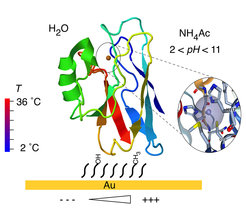Boehringer Ingelheim Foundation "Plus 3" Funding for Dr. Katrin F. Domke
The prestigious “Plus 3” grant of 900,000 euros enables Dr. Domke to expand her spectra-electrochemical research toward complex biophysical processes of metalloproteins. With help of the novel nearfield Raman spectroscopy tool for solid/liquid interfaces, EC-TERS, recently developed in the Domke group, a detailed quasi-atomistic picture of the redox behaviour of individual azurin molecules under realistic reaction conditions will be developed. Such studies at the forefront of single-molecules biochemical research could aid in the discovery of key mechanisms that underlie physiological diseases related to, for example, co-factor mismatch or protein misfiling and facilitate targeted drug design.

About the person
Dr. Katrin F. Domke has been leading an independent research group at the Max Planck Institute for Polymer Research since November 2012. Her work aims to real-time image and spatially resolve nanoscale molecular processes that occur at electrified solid/liquid interfaces with help of advanced in situ nearfield and nonlinear Raman spectroscopies. Dr. Domke studied electrochemistry in Bonn and Alicante, obtained her PhD in nearfield surface spectroscopy at the Fritz Haber Institute/FU Berlin and studied heterogeneous catalysis with nonlinear spectra-microscopy at FOM Institute AMOLF in Amsterdam as a Feodor Lynen postdoc. Her development and application of novel electrochemical tip-enhanced Raman spectroscopy was supported by the Emmy Noether Program of the German Research Foundation (DFG).
About "Plus 3" Funding
With the "Plus 3" Perspectives Program, the Boehringer Ingelheim Foundation supports outstanding, non-tenured group leaders doing basic research in biology, chemistry, or medicine. The "Plus 3" Program provides independent group leaders with time, freedom and flexibility to reach their scientific potential, to advance and develop their research programs. "Plus 3" thereby creates the best conditions for long-term prospects in an optimal research environment.












